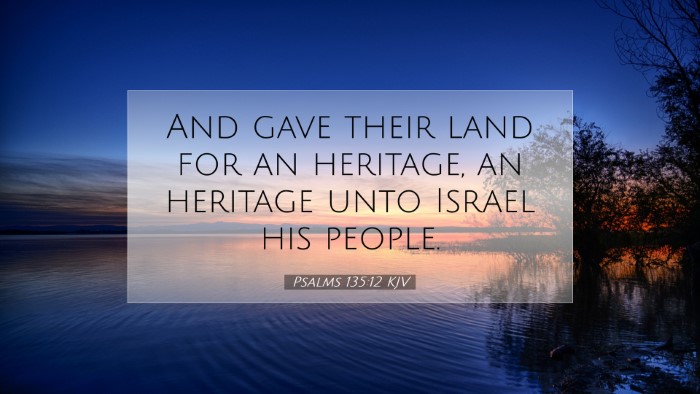Psalms 135:12 - A Commentary
Verse: "And gave their land for a heritage, a heritage unto Israel His people." (Ps 135:12)
Introduction
The verse from Psalms 135:12 encapsulates the themes of divine inheritance and the providential favor bestowed upon Israel. This commentary will draw from the insights of public domain commentaries, notably those by Matthew Henry, Albert Barnes, and Adam Clarke, to explore the theological implications and historical context of this passage.
Theological Insights
This verse reflects God’s sovereignty and faithfulness. It is a declaration of His deliberate choice to bless Israel with a land of heritage, symbolizing not just physical territory but also spiritual inheritance.
God's Sovereignty
God is depicted as the supreme ruler who allocates lands as He sees fit. Matthew Henry emphasizes that the giving of heritage is a sign of God's dominion over nations. It serves as a reminder that while geopolitical powers may appear dominant, ultimately, it is God who decides the rightful ownership of lands.
The Nature of Heritage
Albert Barnes notes the term “heritage” signifies more than land; it symbolizes God’s covenant with His people. The Israelites were not merely given land but were provided a place to worship and grow as a community of faith. This heritage denotes a relational aspect, intertwined with the presence of God among His people.
Historical Context
This passage reflects a historical moment in Israel's narrative, particularly as they settled into the promised land after a long period of wandering in the wilderness. Adam Clarke elucidates that this text points back to the conquest of Canaan under Joshua, where God fulfilled His promises to Abraham, Isaac, and Jacob by granting their descendants a land of rest.
Conquest and Settlement
The act of giving land as a heritage can be associated with the defeat of various nations. The land was not merely acquired through conquest but was given by God, signifying divine approval of Israel’s occupancy. This highlights the importance of recognizing God’s hand in historical events.
Reflection on the Heritage
The concept of “heritage” invites reflection on what it means to inherit promises. For the Israelites, the land was a tangible sign of God’s faithfulness. For believers today, as noted by Henry, this can be paralleled to the spiritual heritage they receive through Christ, which includes promises of eternal life, fellowship with God, and a place in His eternal kingdom.
A Call to Stewardship
This privilege comes with a responsibility. The people of Israel were called to stewardship of the land and to maintain its sanctity as a place for God’s worship. Many commentaries stress the importance of recognizing that heritage must be cherished and upheld, bringing God glory through how it is respected.
Contemporary Applications
For modern believers, this verse serves as a reminder of God’s ongoing work in history and His promises to us. The idea of spiritual inheritance is crucial, pointing to the blessings found in Christ.
Understanding Our Inheritance
- Spiritual Heritage: Believers are heirs to a promise—a heritage that cannot be eroded by the passage of time.
- The Role of Community: Just as Israel was a community, Christians are called to live out their faith collectively, supporting one another in the stewardship of their heritage.
- Divine Providence: Acknowledging God’s hand in our spiritual journeys can reinforce faith and encourage gratitude.
Conclusion
Psalms 135:12 serves as a rich reservoir of theological insights about God’s sovereignty, faithfulness, and the idea of heritage. The understanding of land and heritage is deeply rooted in Israel's identity and extends to the spiritual realities for contemporary believers. Through this passage, we are invited to reflect on our own heritage and the responsibilities that come with it as we acknowledge the Lord's provision and presence in our lives.


